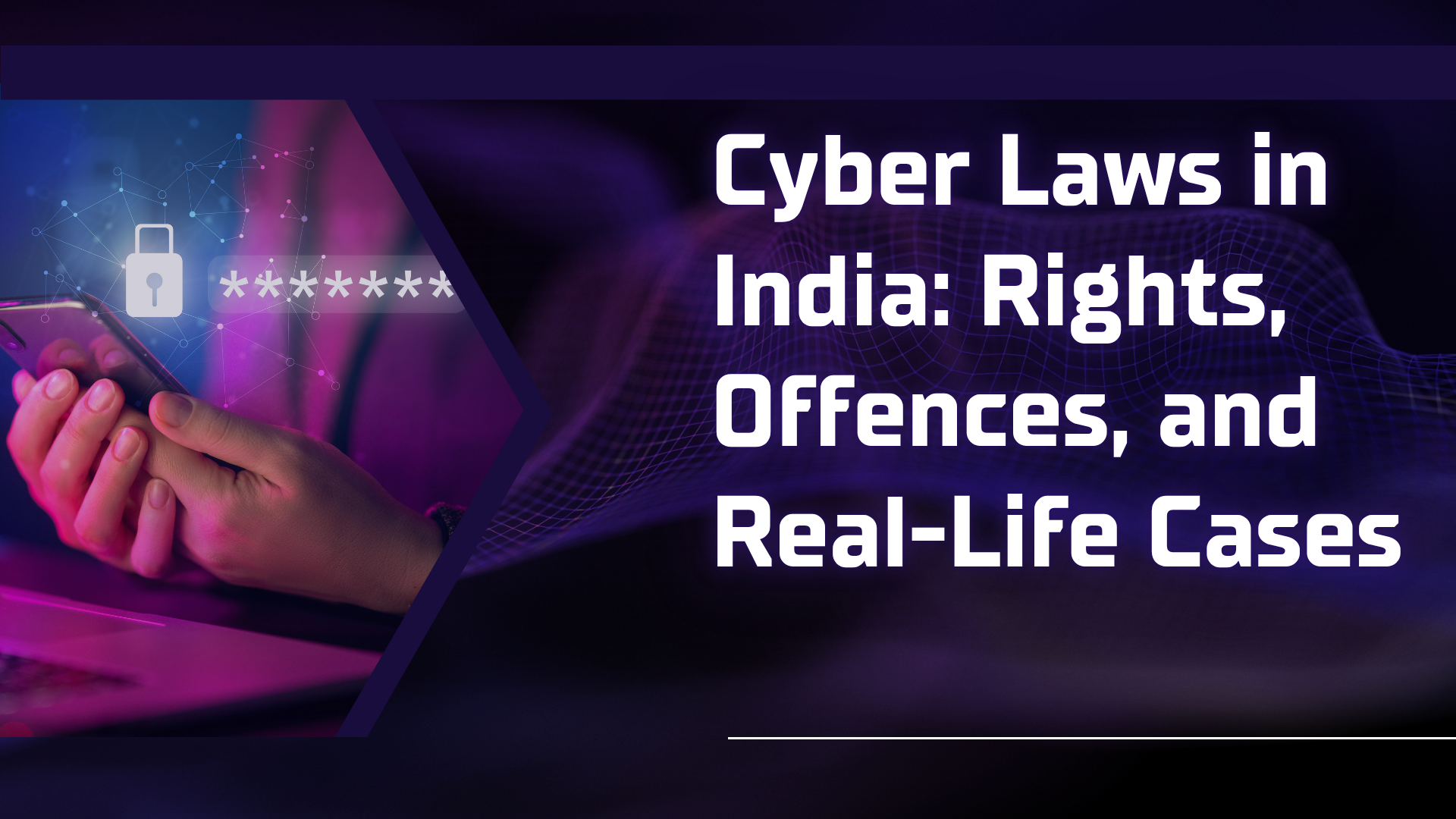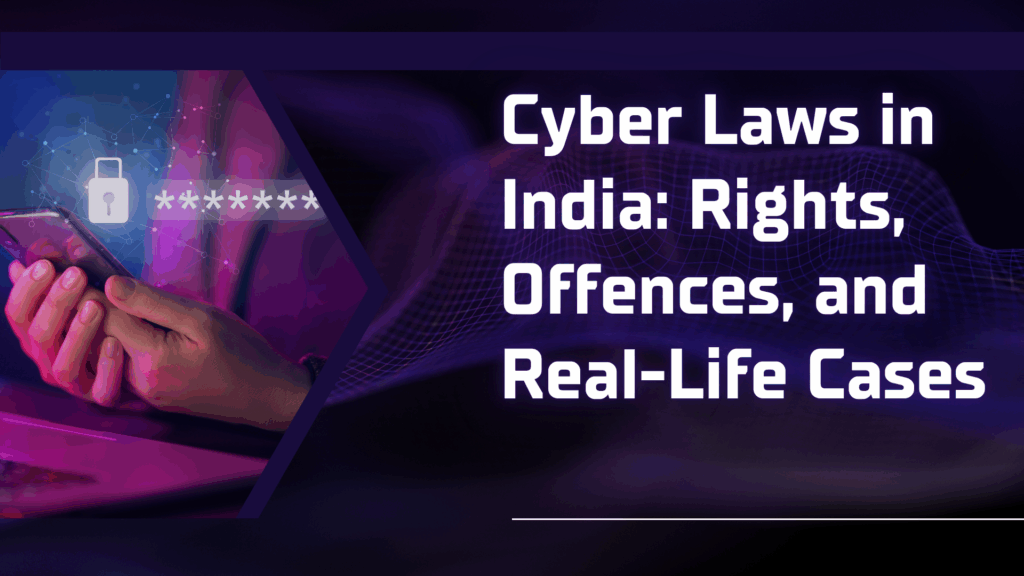Everyone should be aware of Cyber Laws in India to ensure their cybersecurity. In this article we have discussed various Rights, offenses, and Real-Life Cases in detail.
Cyber Laws in India: Rights, Offences, and Real-Life Cases
In a country with over 850 million internet users, cyber law in India has become critical to safeguarding personal data, preventing online crimes, and enforcing digital accountability. The rise of e-commerce, fintech, and social media has made India both digitally empowered and digitally vulnerable. Cyber laws ensure that individuals and organizations using the internet are protected from fraud, identity theft, cyberstalking, data breaches, and other cyber offences.
The Legal Framework of Cyber Laws in India
The primary legislation that governs cyber laws in India is the Information Technology Act, 2000 (IT Act), which was later amended in 2008. This law addresses various online crimes and provides legal recognition for electronic transactions and signatures.

Some key provisions under the IT Act include:
- Section 43: Penalty for unauthorized access, data theft, or virus introduction
- Section 66: Punishment for computer-related offences
- Section 66C: Identity theft and impersonation using electronic means
- Section 66D: Cheating by impersonation through computer resources
- Section 67: Publishing or transmitting obscene material online
- Section 69: Government’s power to intercept or monitor digital communications
These provisions work in tandem with sections from the Indian Penal Code (IPC), such as criminal intimidation, defamation, and extortion, when applied to cyber contexts.
Key Rights of Individuals Under Cyber Law
Every citizen in India using the internet has certain rights safeguarded by law. Understanding these rights can help prevent online exploitation and ensure legal recourse when violations occur.
Important cyber rights include:
- Right to privacy: Protected under Article 21 and enforced in digital platforms.
- Right to be forgotten: Though not formally legislated, Indian courts have upheld limited versions of this right in several judgments.
- Right to secure digital transactions: Companies are mandated to protect user financial data.
- Right to information: Citizens can seek details of surveillance or data collection from authorities through RTI (with limitations).
Common Cyber Offences in India
As internet penetration deepens, cybercrimes are growing in number and complexity. These offences can impact individuals, businesses, and even governments.
| Type of Cyber Offence | Description | Punishment |
|---|---|---|
| Phishing | Fraudulent attempt to obtain sensitive info | 3 years + fine under Section 66D |
| Cyberstalking | Online harassment or stalking | 3 years for first offence |
| Hacking | Unauthorized access to digital devices | Up to 3 years and/or fine |
| Identity Theft | Use of someone’s personal information without consent | Up to 3 years under Section 66C |
| Obscene content distribution | Uploading or sharing obscene material | Up to 5 years and fine |
| Online defamation | Posting false information to harm reputation | Covered under IPC & IT Act |
Real-Life Cybercrime Cases in India
Understanding actual cases helps in appreciating the seriousness of cyber threats and the role of law enforcement.
1. Mumbai ATM Fraud (2016):
Hackers cloned debit cards and withdrew cash from overseas ATMs. Over ₹2.5 crore was lost. The case exposed vulnerabilities in Indian banking systems and led to the strengthening of cybersecurity protocols.
2. Bulli Bai App Case (2022):
Targeting Muslim women with doctored images for “online auction,” this case raised serious concerns about digital harassment. Multiple arrests were made under IT Act and IPC provisions.
3. Cosmos Bank Hack (2018):
In one of India’s biggest cyber heists, ₹94 crore was siphoned off using malware and ATMs across 28 countries. The case prompted Indian banks to upgrade their server-level cybersecurity.
Challenges and the Way Forward
Despite strong laws, challenges remain in terms of enforcement, digital literacy, and cross-border jurisdiction. Most cyber offences are underreported due to shame or lack of awareness. Also, law enforcement often lacks the training and infrastructure to tackle sophisticated cybercrime.
To bridge these gaps, the government has initiated efforts like:
- Cyber Surakshit Bharat Initiative to promote awareness and capacity building
- Launch of Indian Cyber Crime Coordination Centre (I4C)
- Increasing cooperation with international cybercrime units
What You Can Do as a Responsible Netizen
- Use strong passwords and two-factor authentication
- Avoid clicking on suspicious links or unknown emails
- Report cyber offences to cybercrime.gov.in
- Be cautious while sharing personal information online
- Educate children and seniors about cyber safety
Cyber law is not just for professionals and hackers; it impacts every citizen who uses the internet. With stronger awareness and effective legal mechanisms, India can build a safer digital future.
Thanks a lot for reading this post with our portal.





